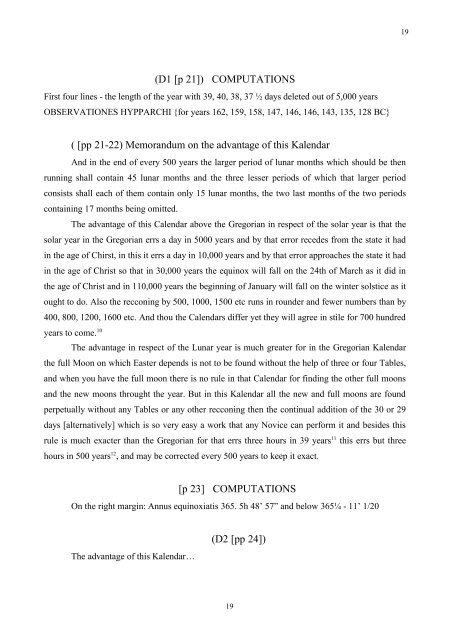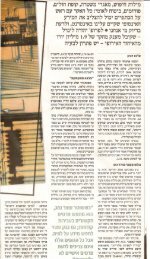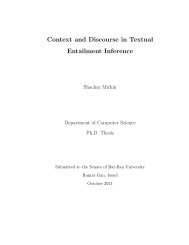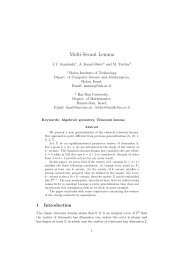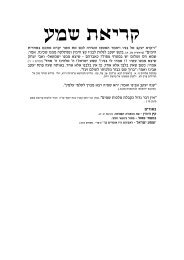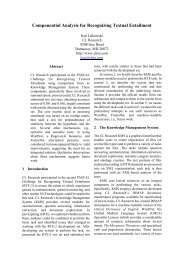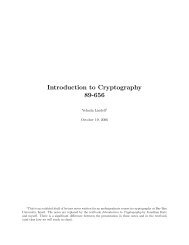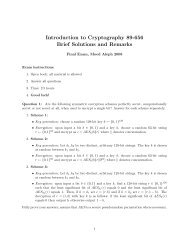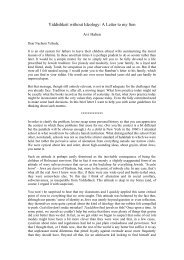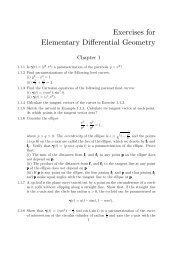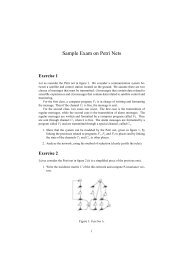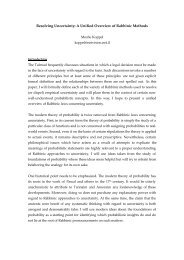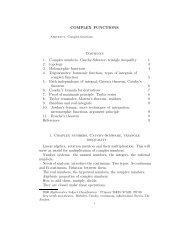Reform of the Julian Calendar as Envisioned by Isaac Newton
Reform of the Julian Calendar as Envisioned by Isaac Newton
Reform of the Julian Calendar as Envisioned by Isaac Newton
You also want an ePaper? Increase the reach of your titles
YUMPU automatically turns print PDFs into web optimized ePapers that Google loves.
19<br />
(D1 [p 21]) COMPUTATIONS<br />
First four lines - <strong>the</strong> length <strong>of</strong> <strong>the</strong> year with 39, 40, 38, 37 ½ days deleted out <strong>of</strong> 5,000 years<br />
OBSERVATIONES HYPPARCHI {for years 162, 159, 158, 147, 146, 146, 143, 135, 128 BC}<br />
( [pp 21-22) Memorandum on <strong>the</strong> advantage <strong>of</strong> this Kalendar<br />
And in <strong>the</strong> end <strong>of</strong> every 500 years <strong>the</strong> larger period <strong>of</strong> lunar months which should be <strong>the</strong>n<br />
running shall contain 45 lunar months and <strong>the</strong> three lesser periods <strong>of</strong> which that larger period<br />
consists shall each <strong>of</strong> <strong>the</strong>m contain only 15 lunar months, <strong>the</strong> two l<strong>as</strong>t months <strong>of</strong> <strong>the</strong> two periods<br />
containing 17 months being omitted.<br />
The advantage <strong>of</strong> this <strong>Calendar</strong> above <strong>the</strong> Gregorian in respect <strong>of</strong> <strong>the</strong> solar year is that <strong>the</strong><br />
solar year in <strong>the</strong> Gregorian errs a day in 5000 years and <strong>by</strong> that error recedes from <strong>the</strong> state it had<br />
in <strong>the</strong> age <strong>of</strong> Chirst, in this it errs a day in 10,000 years and <strong>by</strong> that error approaches <strong>the</strong> state it had<br />
in <strong>the</strong> age <strong>of</strong> Christ so that in 30,000 years <strong>the</strong> equinox will fall on <strong>the</strong> 24th <strong>of</strong> March <strong>as</strong> it did in<br />
<strong>the</strong> age <strong>of</strong> Christ and in 110,000 years <strong>the</strong> beginning <strong>of</strong> January will fall on <strong>the</strong> winter solstice <strong>as</strong> it<br />
ought to do. Also <strong>the</strong> recconing <strong>by</strong> 500, 1000, 1500 etc runs in rounder and fewer numbers than <strong>by</strong><br />
400, 800, 1200, 1600 etc. And thou <strong>the</strong> <strong>Calendar</strong>s differ yet <strong>the</strong>y will agree in stile for 700 hundred<br />
years to come. 10<br />
The advantage in respect <strong>of</strong> <strong>the</strong> Lunar year is much greater for in <strong>the</strong> Gregorian Kalendar<br />
<strong>the</strong> full Moon on which E<strong>as</strong>ter depends is not to be found without <strong>the</strong> help <strong>of</strong> three or four Tables,<br />
and when you have <strong>the</strong> full moon <strong>the</strong>re is no rule in that <strong>Calendar</strong> for finding <strong>the</strong> o<strong>the</strong>r full moons<br />
and <strong>the</strong> new moons throught <strong>the</strong> year. But in this Kalendar all <strong>the</strong> new and full moons are found<br />
perpetually without any Tables or any o<strong>the</strong>r recconing <strong>the</strong>n <strong>the</strong> continual addition <strong>of</strong> <strong>the</strong> 30 or 29<br />
days [alternatively] which is so very e<strong>as</strong>y a work that any Novice can perform it and besides this<br />
rule is much exacter than <strong>the</strong> Gregorian for that errs three hours in 39 years 11 this errs but three<br />
hours in 500 years 12 , and may be corrected every 500 years to keep it exact.<br />
[p 23] COMPUTATIONS<br />
On <strong>the</strong> right margin: Annus equinoxiatis 365. 5h 48’ 57” and below 365¼ - 11’ 1/20<br />
The advantage <strong>of</strong> this Kalendar…<br />
(D2 [pp 24])<br />
19


